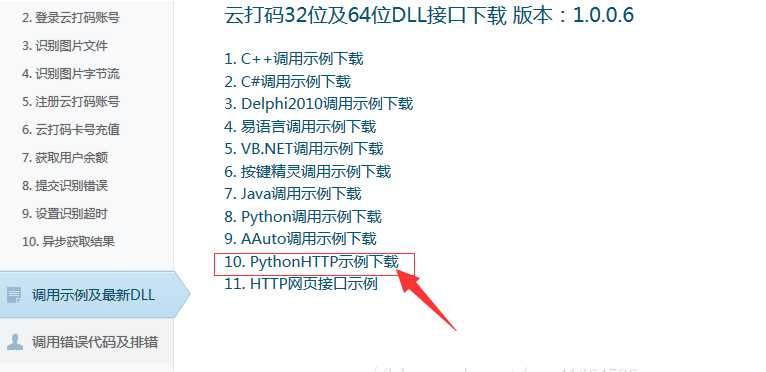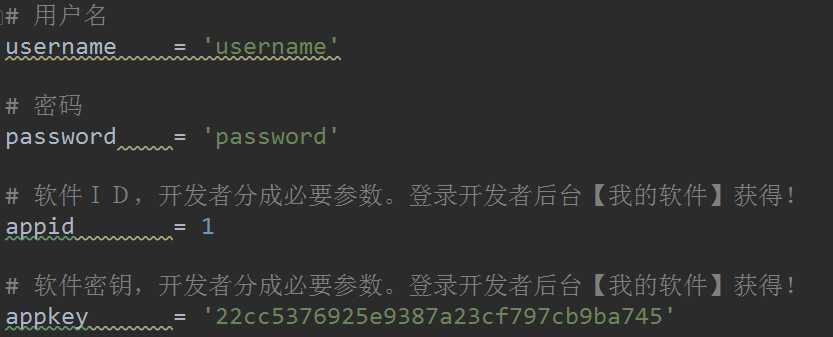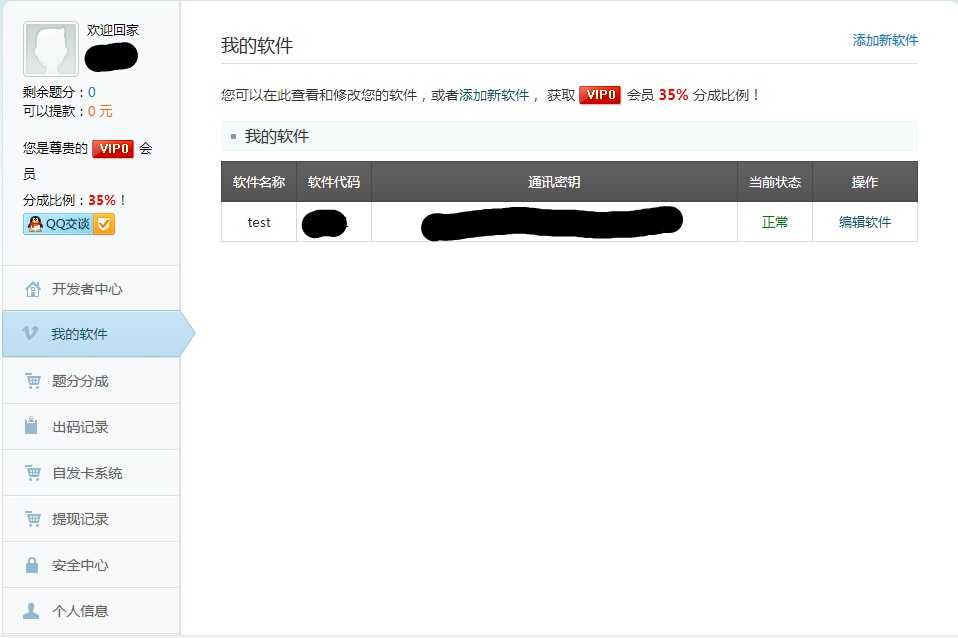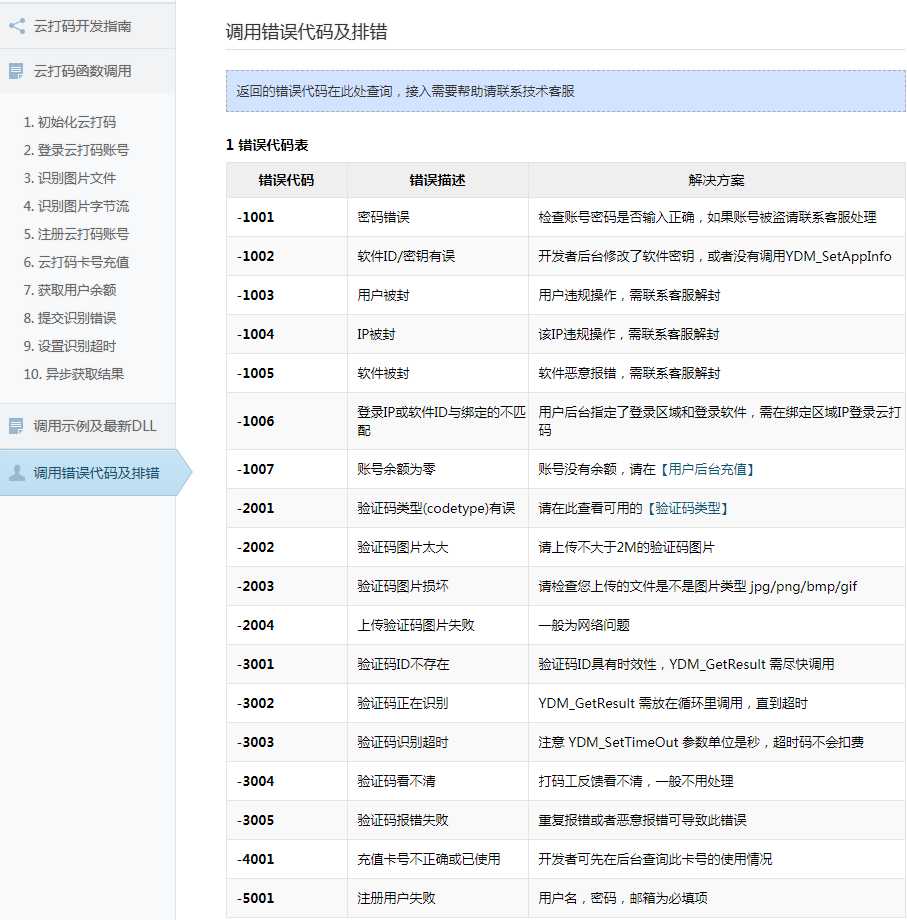【Python3爬虫】使用云打码识别验证码
2021-05-17 03:31
标签:target size class 打开 ESS file soscw epo 还需要 本来是学着使用tesserocr来识别验证码的,但是由于tesserocr的识别率不高,还是学了一下使用云打码来识别验证码== 1、首先是注册账号,然后进入这个网址(http://www.yundama.com/apidoc/YDM_SDK.html)选择PythonHTTP示例下载: 2、下载后解压,可以看到有如下几个文件,因为我使用的Python版本是3.5,所以打开YDMHTTPDemo3.x: 3、打开之后修改如下几个部分,用户名和密码就是你的用户名和密码,而appid和appkey需要进入开发者后台查看,第一次使用的时候还需要新建一个软件,才能有appid和appkey: 下图中的软件代码就是appid,通讯密钥就是appkey: 4、把信息都添加进去后运行代码,不出意外会返回一个1007,进入错误代码及排错(http://www.yundama.com/apidoc/YDM_ErrorCode.html)查找原因,原来是因为账户没有余额 然后进入用户后台充值就行了,充值完以后再次运行代码,就可以看到识别结果了。 进行完如上步骤之后,我们就可以使用云打码平台来识别验证码了,不过为了使用方便,可以建一个YDMDemo.py,把账号密码等信息写进去,调用的时候只需要传入验证码图片就行了。 【Python3爬虫】使用云打码识别验证码 标签:target size class 打开 ESS file soscw epo 还需要 原文地址:https://www.cnblogs.com/TM0831/p/9747207.html具体步骤如下:





1 import json
2 import time
3 import requests
4
5
6 class YDMHttp:
7 apiurl = ‘http://api.yundama.com/api.php‘
8 username = ‘‘
9 password = ‘‘
10 appid = ‘‘
11 appkey = ‘‘
12
13 def __init__(self, username, password, appid, appkey):
14 self.username = username
15 self.password = password
16 self.appid = str(appid)
17 self.appkey = appkey
18
19 def request(self, fields, files=[]):
20 response = self.post_url(self.apiurl, fields, files)
21 response = json.loads(response)
22 return response
23
24 def balance(self):
25 data = {‘method‘: ‘balance‘, ‘username‘: self.username, ‘password‘: self.password, ‘appid‘: self.appid,
26 ‘appkey‘: self.appkey}
27 response = self.request(data)
28 if response:
29 if response[‘ret‘] and response[‘ret‘] 0:
30 return response[‘ret‘]
31 else:
32 return response[‘balance‘]
33 else:
34 return -9001
35
36 def login(self):
37 data = {‘method‘: ‘login‘, ‘username‘: self.username, ‘password‘: self.password, ‘appid‘: self.appid,
38 ‘appkey‘: self.appkey}
39 response = self.request(data)
40 if response:
41 if response[‘ret‘] and response[‘ret‘] 0:
42 return response[‘ret‘]
43 else:
44 return response[‘uid‘]
45 else:
46 return -9001
47
48 def upload(self, filename, codetype, timeout):
49 data = {‘method‘: ‘upload‘, ‘username‘: self.username, ‘password‘: self.password, ‘appid‘: self.appid,
50 ‘appkey‘: self.appkey, ‘codetype‘: str(codetype), ‘timeout‘: str(timeout)}
51 file = {‘file‘: filename}
52 response = self.request(data, file)
53 if response:
54 if response[‘ret‘] and response[‘ret‘] 0:
55 return response[‘ret‘]
56 else:
57 return response[‘cid‘]
58 else:
59 return -9001
60
61 def result(self, cid):
62 data = {‘method‘: ‘result‘, ‘username‘: self.username, ‘password‘: self.password, ‘appid‘: self.appid,
63 ‘appkey‘: self.appkey, ‘cid‘: str(cid)}
64 response = self.request(data)
65 return response and response[‘text‘] or ‘‘
66
67 def decode(self, filename, codetype, timeout):
68 cid = self.upload(filename, codetype, timeout)
69 if cid > 0:
70 for i in range(0, timeout):
71 result = self.result(cid)
72 if result != ‘‘:
73 return cid, result
74 else:
75 time.sleep(1)
76 return -3003, ‘‘
77 else:
78 return cid, ‘‘
79
80 def report(self, cid):
81 data = {‘method‘: ‘report‘, ‘username‘: self.username, ‘password‘: self.password, ‘appid‘: self.appid,
82 ‘appkey‘: self.appkey, ‘cid‘: str(cid), ‘flag‘: ‘0‘}
83 response = self.request(data)
84 if response:
85 return response[‘ret‘]
86 else:
87 return -9001
88
89 def post_url(self, url, fields, files=[]):
90 for key in files:
91 files[key] = open(files[key], ‘rb‘)
92 res = requests.post(url, files=files, data=fields)
93 return res.text
94
95
96 def use_ydm(filename):
97 username = ‘‘ # 用户名
98 password = ‘‘ # 密码
99 app_id = 1 # 软件ID
100 app_key = ‘‘ # 软件密钥
101 code_type = 1004 # 验证码类型
102 timeout = 60 # 超时时间,秒
103 yundama = YDMHttp(username, password, app_id, app_key) # 初始化
104 balance = yundama.balance() # 查询余额
105 print(‘您的题分余额为{}‘.format(balance))
106 cid, result = yundama.decode(filename, code_type, timeout) # 开始识别
107 print(‘识别结果为{}‘.format(result))
108 return result
文章标题:【Python3爬虫】使用云打码识别验证码
文章链接:http://soscw.com/index.php/essay/86550.html